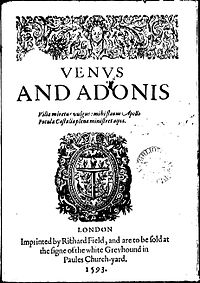If I must describe the
poem in three words, I will say, “So very beautiful.” It's
actually really romantic and smart. Venus and Adonis is one of
Shakespeare's narrative poems, along with Lucrece, which I
hope to read pretty soon.
The plot is basely
taken from an old Greek myth, about a young mortal man called Adonis,
who drives Venus to intense dotage. She loves the boy very much, but
unfortunately, the feeling is not mutual. Adonis thinks himself too
young for love, and he doesn't even understand either the word or the
feeling, leaving the goddess of love in great despair.
The story opens with
Venus snatching Adonis away from his horse, then pins him down to
earth, and showers him with kisses – against his will. She woos
him, flatters him with words of love, while imprisons him with her
arms so that he may not get away. Adonis is not moved. She then tells
him that even Mars yields to her. The boy is still not interested.
And now Adonis with a lazy spright,
And with a heavy, dark, disliking eye,
His louring brows o’erwhelming his fair sight,
Like misty vapours when they blot the sky,
Souring his cheeks, cries, ’Fie! no more of love:
The sun doth burn my face; I must remove.’
He releases himself
from Venus and walks towards his horse, which then runs away with his
lover. Venus uses the chance to show him that love is something
really strong that cannot and should not be resisted. The unlucky boy
clearly doesn't agree. The goddess then faints, or pretends to faint,
and Adonis tries his best to wake her up. There he kisses the
goddess, giving her exactly what she wants of him. The goddess awakes
and again kisses him. Hmm, so many kisses, too many perhaps, in this
one poem.
Anyway, it doesn't mean
that Adonis yields. He again states that he's going home and that he
intends to go hunting with his friend the next day. Venus tries to
stop him, knowing that he will be dead if he goes. But Adonis is
adamant. He even tells Venus that all her sweet words are product of
Lust instead of Love and the more she persuades the more he hates
her.
’Call it not, love, for Love to heaven is fled,
Since sweating Lust on earth usurp’d his name;
The prophecy comes
true. The next day, Venus tries to find Adonis and finds him dead,
killed by a boar. She then prophesies the suffering that will come
upon lovers, which is very, very sad, but beautiful at the same time.
’It shall suspect where is no cause of fear;
It shall not fear where it should most mistrust;
It shall be merciful, and too severe,
And most deceiving when it seems most just;
Perverse it shall be, where it shows most toward,
Put fear to velour, courage to the coward.
’It shall be cause of war and dire events,
And set dissension twixt the son and sire;
Subject and servile to all discontents,
As dry combustious matter is to fire:
Sith in his prime Death doth my love destroy,
They that love best their love shall not enjoy.
As I said before, the
poem is all about love. And, seeing that the heroine is the Goddess
of Love herself, you would expect a lot of Lustful Love in it. I may
as well say that this poem is a beautiful description of desire and
lust, done by the Bard himself – William Shakespeare. Ooh, I will
never get tired of his work.


















No comments:
Post a Comment